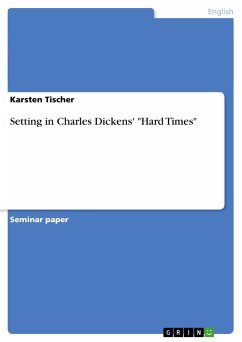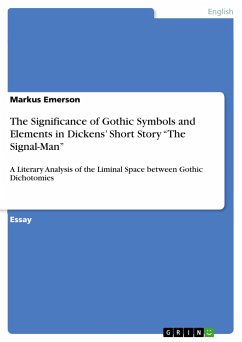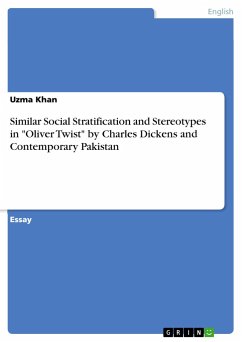
About Charles Dickens' social-realist novel 'Hard Times'
Versandkostenfrei!
Versandfertig in 1-2 Wochen
14,99 €
inkl. MwSt.

PAYBACK Punkte
0 °P sammeln!
Essay aus dem Jahr 2005 im Fachbereich Anglistik - Kultur und Landeskunde, Note: 1,7, Humboldt-Universität zu Berlin, Sprache: Deutsch, Abstract: Charles Dickens' social-realist novel Hard Times was his only novel published in weekly parts in his magazine Household Words in 1854. The serial publication was combined with the insertion of journalistic articles on themes which were discussed in the novel, so that "the journalism and the fiction nourished each other" (Simpson). In his novel Dickens depicts the life of men, women and children at the time of Industrial Revolution and points to them...
Essay aus dem Jahr 2005 im Fachbereich Anglistik - Kultur und Landeskunde, Note: 1,7, Humboldt-Universität zu Berlin, Sprache: Deutsch, Abstract: Charles Dickens' social-realist novel Hard Times was his only novel published in weekly parts in his magazine Household Words in 1854. The serial publication was combined with the insertion of journalistic articles on themes which were discussed in the novel, so that "the journalism and the fiction nourished each other" (Simpson). In his novel Dickens depicts the life of men, women and children at the time of Industrial Revolution and points to themes like trade unions, political economy, education, marriage and divorce. Along with the changing political and economic structures, the role of women began to change in the middle of the 19th century.The so-called Women question was concerned with traditional roles of women who were valued for their tenderness and domestic affection, but who had no political rights. Since male writers of theVictorian period were often accused of inserting female characters "insignificant both in mind and body" (Perkins), it is very interesting to have a closer look at the representation of Victorian women and the Women question in Charles Dickens' novel.












